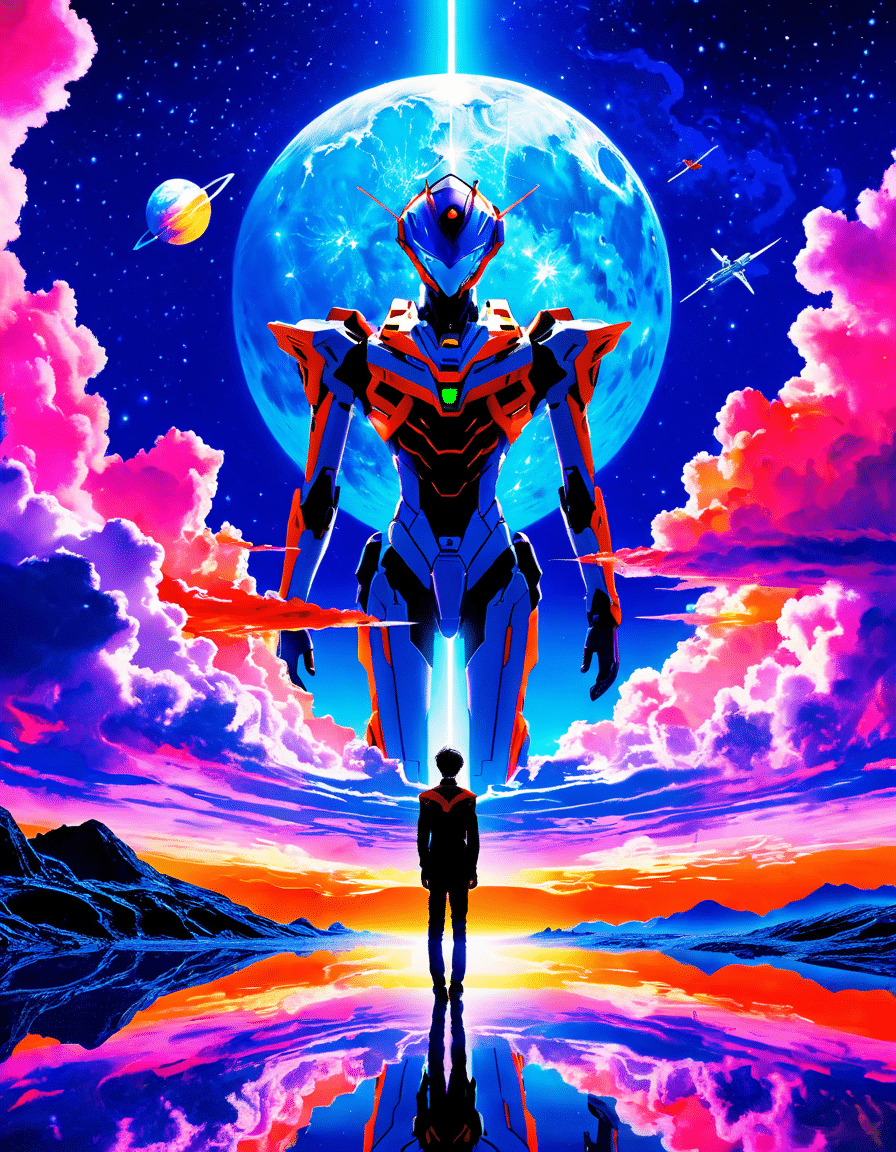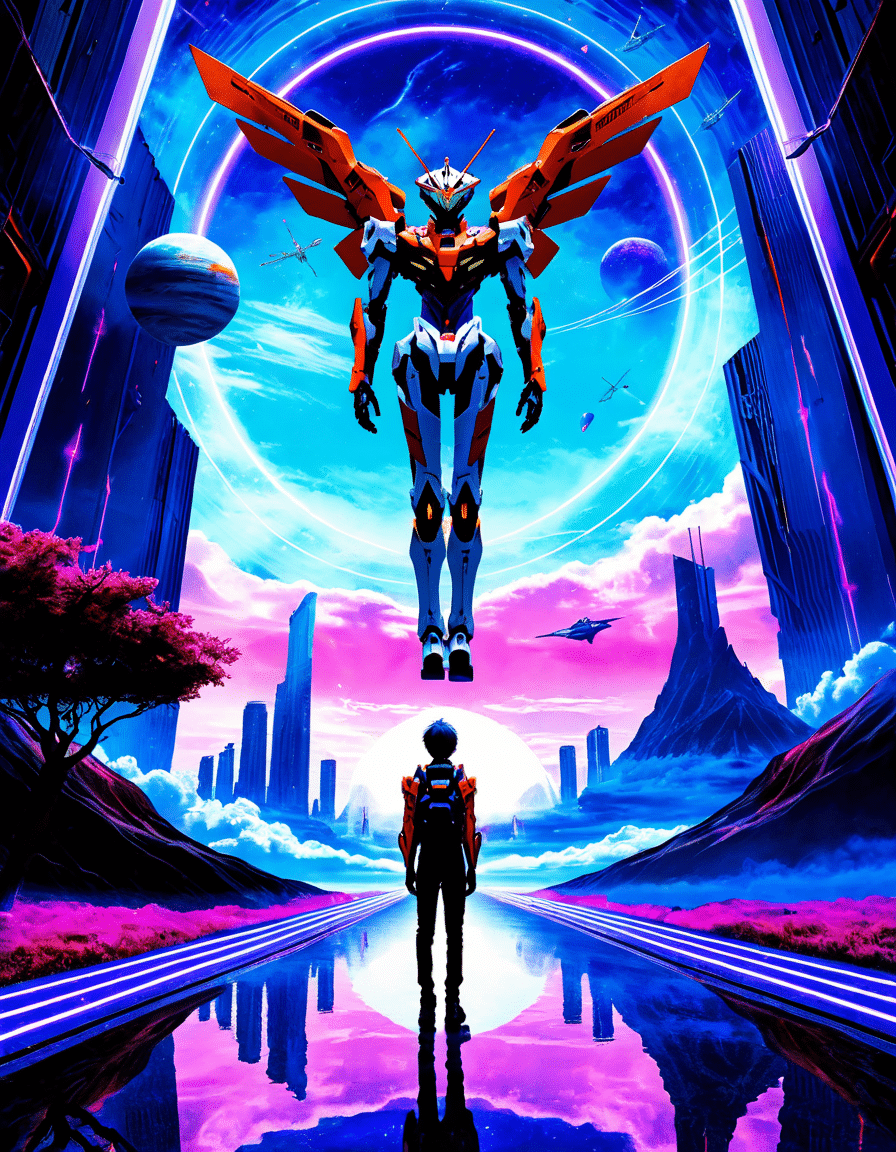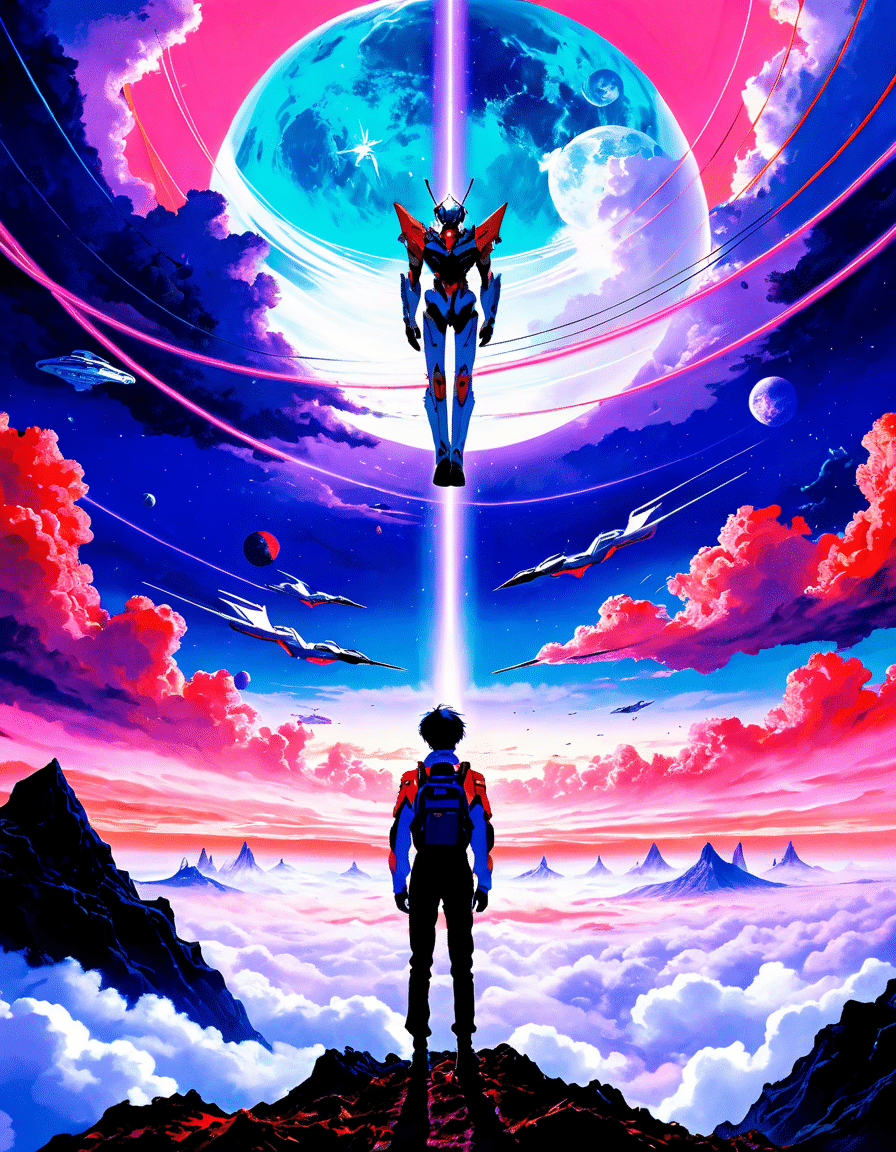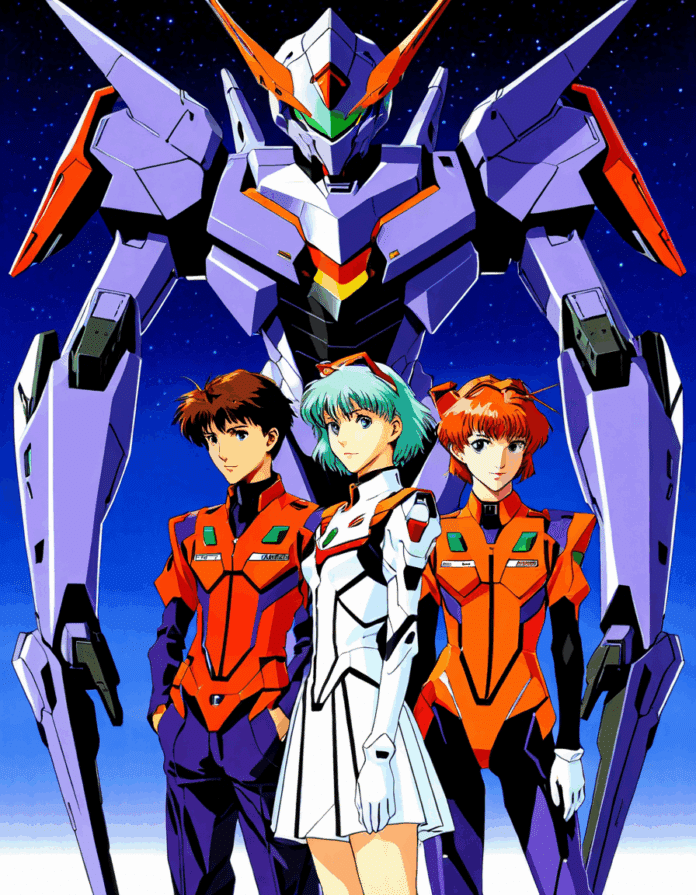Anime has taken many turns throughout the years, but few series have left a mark quite like Neon Genesis Evangelion. Premiering in 1995, this monumental show didn’t just change the way we view giant robots; it intertwined a slew of psychological and philosophical themes into a brilliantly crafted tapestry. By exploring the intricacies of the human experience, Neon Genesis Evangelion has carved a permanent spot in anime history, fundamentally redefining storytelling within the medium. Strap in, folks, as we delve into the incredible legacy and quirky nuances of this groundbreaking series.

1. The Legacy of Neon Genesis Evangelion in Anime History
When we talk about the legacy of Neon Genesis Evangelion, we’re not just talking about a cult classic; we’re discussing a series that reshaped anime’s very fabric. Prior to its release, most mecha anime revolved around action and flashy battles, but Evangelion took viewers on a ride into the human psyche. The character of Shinji Ikari, with his struggles with rejection and identity, reflects a depth many fans found relatable. Rather than simply evolving through battles, these characters evolve through their personal crises—something Evangelion pulled off brilliantly.
As Neon Genesis Evangelion tackled themes like existential dread and complex emotional conflicts, it inspired creators across various genres and formats. Many series after it, like Paranoia Agent and Monster, have incorporated similar elements. Viewers now ask not just “who will win?” but “what motivates this character?” Let’s face it; sometimes you’d rather binge a show with depth than one that just serves up flashy lights and sound effects. And Evangelion showed that depth could be both engaging and commercially viable.
Moreover, Neon Genesis Evangelion played a vital role in elevating anime’s status in global pop culture. Its philosophical and often heavy themes lead to deeper discussions among audiences, much like the conversations around legendary shows, such as Game of Thrones or even The Sopranos. With fan theories popping up like popcorn, Evangelion cultivated a fervent fan community, ready to dissect its every nuance. Seriously, have you ever seen fans go head-to-head over character motivations? It’s like watching a championship debate without the referee!

2. Top 5 Ways Neon Genesis Evangelion Redefined Storytelling in Anime
When it comes to altering the storytelling landscape of anime, Neon Genesis Evangelion certainly didn’t hold back. Here are five key aspects that showcase how this phenomenal series set the stage for countless others:
2.1 Complex Characters and Psychological Depth
If you’ve ever seen a show where the protagonist seems too perfect or predictable, then you know how refreshing it is to meet characters like Shinji Ikari or Asuka Langley Soryu. Neon Genesis Evangelion dared to portray the raw, often uncomfortable realities of youth. Rather than the usual overconfident hero, we have Shinji, a character struggling under the weight of his father’s expectations and grappling with his profound sense of inadequacy. Does it strike a chord? You bet it does!
These character arcs help viewers connect on an emotional level. Much like how a young Michael jacksons music resonated with people sharing similar struggles, Evangelion reminds us of our own emotional battles. This thematic depth paved the way for subsequent series to explore complex character relationships and inner thoughts more deeply. If you’re game for a wild ride through emotional intricacies, we recommend shows like Monogatari or Your Lie in April.
2.2 Dismantling Genre Conventions
Now, let’s talk about flipping the script. While most mecha series relied heavily on action sequences and battles, Neon Genesis Evangelion took a different route. Instead of relying solely on epic clashes, the show portrayed its Evas as extensions of the pilots’ inner turmoil. How brilliantly ingenious is that?
By highlighting personal dilemmas, Evangelion not only baffled viewers but also influenced later works. You can see this evolution in series like Aldnoah.Zero and Code Geass, which intertwine action with their characters’ emotional struggles. Watching these shows, you realize the real battle isn’t just against external forces but within ourselves too. And hey, who doesn’t like a little introspection between explosions?
2.3 Incorporation of Philosophical and Religious Themes
Ah, philosophy—the perfect seasoning for any narrative stew! Neon Genesis Evangelion isn’t shy about diving into complex philosophical waters, often referencing Freudian psychoanalysis and existentialism. It even taps into religious imagery, intertwining concepts from Kabbalah and other traditions throughout the story. The juxtaposition of these themes leaves viewers pondering societal issues that resonate even today.
As new anime emerge, you might spot echoes of Evangelion‘s philosophical musings. Shows like Serial Experiments Lain and The Person Who is 2D tread the same mysterious path. With each story, audiences continue to explore deeper meanings, creating opportunities for discussion that rival the fervor seen in debates surrounding a popular movie like Inception. It’s pretty fun to discuss, isn’t it?
2.4 Artistic Innovation and Visual Symbolism
What’s a groundbreaking anime without stunning visuals? Neon Genesis Evangelion breaks the mold with its distinctive art style and symbolic storytelling. By employing a mix of static and motion graphics, along with abstract imagery, the series encourages viewers to engage actively.
This innovation sets a high bar for later anime, inspiring works like Your Name and Attack on Titan, both laden with visual metaphors. How many times have we seen an image resonate more powerfully than any dialogue? With striking visuals, these shows transcend mere entertainment, creating lasting impressions that stay with us long after the credits roll.
2.5 Transforming Fandom and Community Engagement
Finally, let’s talk fandom. Neon Genesis Evangelion birthed a dedicated community willing to dissect every nuance and character arc. It’s fascinating to think how Evangelion opened doors for online discussions that remind us of how Team umizoomi teaches kids problem-solving.
Fans eagerly engage in debates, share theories, and develop lore that enriches the Evangelion universe. This participatory culture mirrors what we see in shows like Breaking Bad and the aforementioned Game of Thrones. The series not only entertains but also invites reflection, creating a legacy where audiences analyze every bit. If you’re not a fan yet, make your way to the community! It’s like hanging out with friends on an epic quest!
3. The Evolution of Nostalgia: Neon Genesis Evangelion’s Enduring Appeal
Fast forward to the 2020s, and you see Neon Genesis Evangelion still holding its ground in pop culture. Nostalgia for this iconic series thrives, thanks in part to remasters and spin-offs. The 2021 film, Evangelion: 3.0+1.0 Thrice Upon a Time, serves as both a conclusion and a celebration of its enduring impact.
Every new generation can bid farewell and say hello to a show that shaped their predecessors. Streaming platforms have played a key role, introducing younger audiences to its brilliant storytelling. Isn’t it amazing how shows like Dante’s GF can reignite interest in older classics? The connections we share through nostalgia bring warmth to our hearts, epic stories to our screens, and valuable lessons to our lives.
4. Analyzing the Cultural Impact of Neon Genesis Evangelion
Neon Genesis Evangelion reached far beyond simple entertainment; it reflected societal concerns and evolving cultural dialogues. Themes such as mental health, consumerism, and individuality resonate profoundly today, making the series as relevant as ever.
New anime now stand at a crossroads: should they tackle complex themes like Evangelion did while remaining commercially viable? With the rise of tokenized storytelling, it becomes important to strike the balance between financial success and substantive narratives. After all, we want our shows to lean into complexity while being enjoyable, right? Just like how Alvin and the Chipmunks (2007 cast) made us laugh while also offering sweetness—seriously, who can resist their charm?
Final Thoughts: Neon Genesis Evangelion as a Cultural Touchstone
At the end of the day, Neon Genesis Evangelion embodies the pinnacle of storytelling in anime. Its influence isn’t limited to captivating narratives but extends to inspiring generations of creators. As we march through the 21st century, the echoes of Evangelion reverberate within the narratives and character journeys of new anime, solidifying its legacy.
So next time you dive into a new series, ask yourself: how did Neon Genesis Evangelion shape this experience? The shows we love reflect a cultural evolution, and every new watch connects us with the broader narrative tapestry of our experiences and stories. Happy viewing!
Neon Genesis Evangelion: Fun Trivia and Interesting Facts
The Cultural Impact of Neon Genesis Evangelion
Neon Genesis Evangelion shook up the anime scene when it came out in the mid-’90s. It didn’t just push the envelope; it entirely redefined what anime could be. Interestingly, fans of the show often point out how its heavy themes resonate in various media. For example, the emotional depth and explorations of human psyche also appear in other forms of storytelling, like Fallout New vegas, which challenges players on moral grounds too. Moreover, the way the series combines mecha action with inner turmoil is reminiscent of how various animated features, like the actors in the Alvin And The Chipmunks 2007 cast, appeal to different ages by mixing fun and depth.
Character Inspirations Beyond Anime
This groundbreaking series has characters that reflect a multitude of experiences. Many of them can be seen as archetypes of people we know in real life. An interesting bit of trivia is that the creator, Hideaki Anno, drew inspiration from various aspects of his life, blending them with surreal storytelling elements. Additionally, did you know that Susanna Hoffs, the iconic musician, once shared her own perspective on characters that resonate emotionally? Just like Landry Allbrights portrayals in other media, these connections make viewers feel more invested in their journeys.
Behind the Scenes and Director’s Vision
Creating Neon Genesis Evangelion wasn’t just about animation; it involved attention to detail that’s often overlooked. The series’ deep philosophical underpinnings leave fans pondering long after the credits roll. Notably, the director’s unique vision came through in stunning details – almost tailoring each episode to reflect the emotional struggles of its characters. One can argue it even influenced how creators like Miyu Pranoto approach storytelling today, especially when crafting intricate narratives. Oh, and speaking of unexpected influences, there’s a pop culture connection with “Dante’s GF, making strides in similarly compelling storytelling.
In conclusion, Neon Genesis Evangelion remains a hallmark in anime history, continually sparking discussions and influencing creators across genres. Whether you’re in a nostalgic mood or discovering the franchise for the first time, there’s always something new to find in its layers of meaning—like a fresh pair of white tennis shoes enhancing an outfit. Dive in, and who knows what revelations await!




